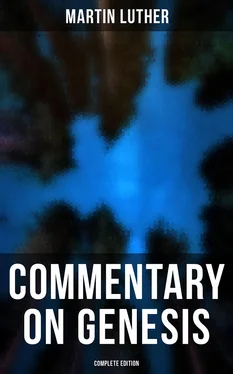Martin Luther - Commentary on Genesis (Complete Edition)
Здесь есть возможность читать онлайн «Martin Luther - Commentary on Genesis (Complete Edition)» — ознакомительный отрывок электронной книги совершенно бесплатно, а после прочтения отрывка купить полную версию. В некоторых случаях можно слушать аудио, скачать через торрент в формате fb2 и присутствует краткое содержание. Жанр: unrecognised, на английском языке. Описание произведения, (предисловие) а так же отзывы посетителей доступны на портале библиотеки ЛибКат.
- Название:Commentary on Genesis (Complete Edition)
- Автор:
- Жанр:
- Год:неизвестен
- ISBN:нет данных
- Рейтинг книги:4 / 5. Голосов: 1
-
Избранное:Добавить в избранное
- Отзывы:
-
Ваша оценка:
- 80
- 1
- 2
- 3
- 4
- 5
Commentary on Genesis (Complete Edition): краткое содержание, описание и аннотация
Предлагаем к чтению аннотацию, описание, краткое содержание или предисловие (зависит от того, что написал сам автор книги «Commentary on Genesis (Complete Edition)»). Если вы не нашли необходимую информацию о книге — напишите в комментариях, мы постараемся отыскать её.
Commentary on Genesis is the last work of Martin Luther, written during the last several years of his life. Luther's work follows the first volume of Psalms with critical and devotional remarks on the creation and on sin and the flood.
Commentary on Genesis (Complete Edition) — читать онлайн ознакомительный отрывок
Ниже представлен текст книги, разбитый по страницам. Система сохранения места последней прочитанной страницы, позволяет с удобством читать онлайн бесплатно книгу «Commentary on Genesis (Complete Edition)», без необходимости каждый раз заново искать на чём Вы остановились. Поставьте закладку, и сможете в любой момент перейти на страницу, на которой закончили чтение.
Интервал:
Закладка:
According to these expressions therefore the solution given by us above to all sceptics, cavillers and objectors stands good, that God in six days finished his work, and that on the "seventh day" he rested from all his work which he had made; that is, that he ceased from ordaining the certain orders of things, and that then, whatsoever he willed afterwards to work, he did work. But God did not say afterwards, "Let there be a new earth;" "Let there be a new sea," etc. With respect to that wonderful "new thing;" that, after the creation was finished, the virgin Mary brought forth the Son of God, it is indeed manifest that God made our calamity, into which we had fallen by sin, the cause of this marvellous blessing. But God so wrought even this mighty work that he showed beforehand that he would, by his Word, do this glorious work also; even as he has also signified in his Word, that he will by the same Word do other marvelous things.
Thus have we replied then to these questions of all cavilling objectors concerning God's having finished the heavens and the earth and concerning his having made other things new afterwards. We must continue this explanation to learn what this Sabbath or rest of God is, and also in what manner God sanctified the Sabbath, as the sacred text declares.
II. V. 3. And God blessed the seventh day, and hallowed it, because that in it he rested from all his work which God had created and made.
Christ says, Mark 2:27, that "the Sabbath was made for man, and not man for the Sabbath." But Moses says nothing here about man. He does not even say positively that any commandment concerning the Sabbath was given to man. But what Moses here says is that God blessed the Sabbath and sanctified it to himself. It is moreover to be remarked that God did this to no other creature. God did not sanctify to himself the heaven nor the earth nor any other creature. But God did sanctify to himself the seventh day. This was especially designed of God, to cause us to understand that the "seventh day" is to be especially devoted to divine worship. For that which is appropriated to God and exclusively separated from all profane uses is sanctified or holy. Hence the expression "to sanctify," "to choose for divine uses or for the worship of God," is often applied by Moses to the sacred vessels of the sanctuary.
It follows therefore from this passage, that if Adam had stood in his innocence and had not fallen he would yet have observed the "seventh day" as sanctified, holy and sacred; that is, he would have taught his children and posterity on that day concerning the will and worship of God; he would have praised God, he would have given him thanks, and would have brought to him his offerings, etc., etc. On the other days he would have tilled his land and attended to his cattle. Nay, even after the fall he held the "seventh day" sacred; that is, he taught on that day his own family. This is testified by the offerings made by his two sons, Cain and Abel. The Sabbath therefore has, from the beginning of the world, been set apart for the worship of God. In this manner nature in its innocency, had it continued unfallen, would have proclaimed the glory and blessings of God. Men would have talked together on the Sabbath day concerning the goodness of their Creator, would have prayed to him, and would have brought to him their offerings, etc. For all these things are implied and signified in the expression "sanctified."
Moreover in this same sanctification of the Sabbath is included and implied the immortality of the human race. Hence the Epistle to the Hebrews speaks most beautifully concerning the rest of God, from the 95th Ps.: "If they shall enter into my rest." For the rest of God is an eternal rest. Adam therefore, had he not fallen, would have lived a certain time in paradise, according to the length of time which God pleased; and afterwards he would have been carried away into that rest of God, which rest God willed not only to intimate unto man, but highly to commend unto him by this sanctification of the Sabbath. Thus had Adam not fallen his life would have been both animal and happy, and spiritual and eternal. But now we miserable men have lost all this felicity of the animal life by sin; and while we do live, we live in the midst of death. Yet since this command of God concerning the Sabbath is left to the Church, God signifies thereby that even that spiritual life shall be restored to us through Christ. Hence the prophets have all diligently searched into these passages, in which Moses obscurely indicates also the resurrection of the flesh and the life immortal.
Further by this sanctification of the Sabbath it is also plainly shown that man was especially created for the knowledge and worship of God. For the Sabbath was not instituted on account of sheep or oxen, but for the sake of men, that the knowledge of God might be exercised and increased by them on that sacred day. Although therefore man lost the knowledge of God by sin, yet God willed that his command concerning the sanctifying of the Sabbath should remain. He willed that on the seventh day both the Word should be preached, and also those other parts of his worship performed, which he himself instituted; to the end that by these appointed means we should first of all think solemnly on our condition in the world as men; that this nature of ours was created at first expressly for the knowledge and the glorifying of God; and also that by these same sacred means we might hold fast in our minds the sure hope of a future and eternal life.
Indeed all things which God willed to be done on the Sabbath are evident signs of another life after this present life. For what need would there be of God's speaking to us by his Word, if we were not designed to live another and eternal life after this life? And if no future life is to be hoped for by us, why do we not live as those other creatures with whom God talketh not and who have no knowledge of God? But as the divine Majesty talketh with man alone, and he alone acknowledges and apprehends God, it necessarily follows that there is for us another life after this life, to which it is our great business to attain by the Word and the knowledge of God. For as to this temporal and present life it is a mere animal life as all the beasts live, which know not God nor the Word.
This then is the meaning of the Sabbath or the "rest" of God. It is a sanctified day of rest, on which God speaks to or talks with us, and we in turn speak to and talk with him in prayer and by faith. The beasts indeed learn to hear and also to understand the voice of man, as dogs, horses, sheep, oxen; and they are also preserved and fed by man. But our condition as men is far better and higher; for we both hear God and know his will, and are called to a sure hope of immortality. This is testified by those most manifest promises concerning the life eternal, which God has plainly revealed to us by his Word, since he gave to the world the obscure significations contained in this divine Book; such as this rest of God and this sanctification of the Sabbath. However these indications concerning the Sabbath are not obscure but evident and plain. For only suppose for a moment that there were no eternal life after this. Would it not immediately follow that we should have no need either of God or his Word? For that which we merely require or do in this life we can have and do without the Word of God. Even as beasts feed, live and grow fat without the Word. For what need is there of the Word to procure meat and drink, thus created for us beforehand?
As God therefore thus giveth us the Word, as he thus commands the preaching and exercising of the Word, as he thus commands the sanctifying of the Sabbath in the worship of himself, all these things prove that there remaineth another life after this life, and that man is created not to a corporeal life only, as the beasts are, but to a life eternal, even as God, who commands and institutes these things, is himself eternal.
Читать дальшеИнтервал:
Закладка:
Похожие книги на «Commentary on Genesis (Complete Edition)»
Представляем Вашему вниманию похожие книги на «Commentary on Genesis (Complete Edition)» списком для выбора. Мы отобрали схожую по названию и смыслу литературу в надежде предоставить читателям больше вариантов отыскать новые, интересные, ещё непрочитанные произведения.
Обсуждение, отзывы о книге «Commentary on Genesis (Complete Edition)» и просто собственные мнения читателей. Оставьте ваши комментарии, напишите, что Вы думаете о произведении, его смысле или главных героях. Укажите что конкретно понравилось, а что нет, и почему Вы так считаете.












